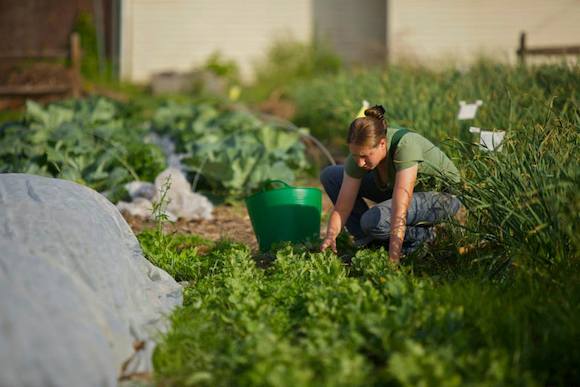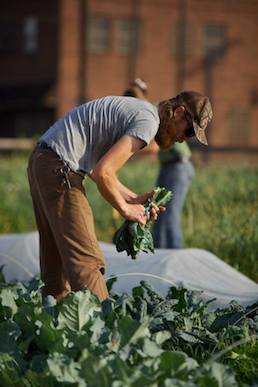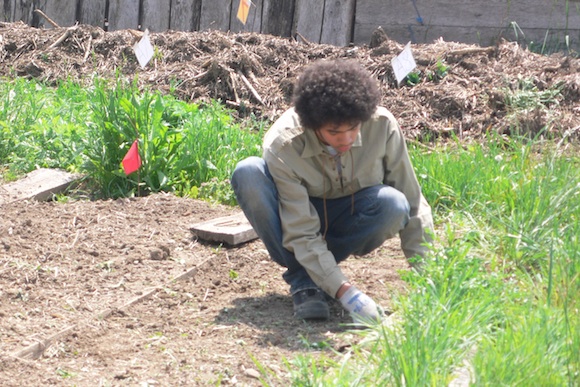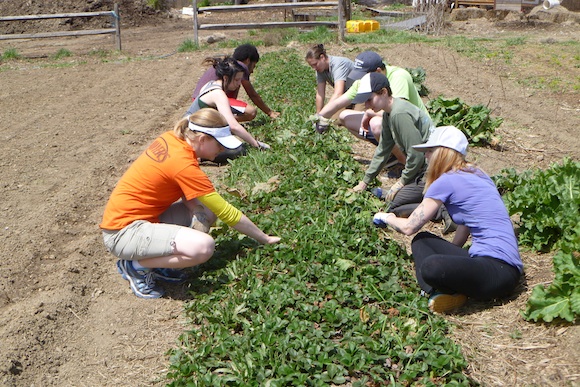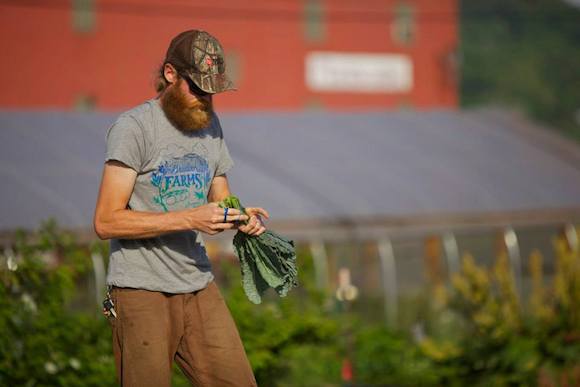Drive a few miles outside of Pittsburgh and the landscape changes dramatically. City streets are replaced by dirt roads, and brick buildings become rolling landscapes. Cows graze along the highway near a large hand painted sign touting the merits of milk. Seeing that verdant agricultural splendor, it's no wonder the local food movement has taken off in Pittsburgh, spreading roots in all directions.
Just southeast of Pittsburgh in the town of Braddock, young urban farmers till the soil at Braddock Farms, shepherded by the non-profit Grow Pittsburgh. The organization's programs are aimed at empowering communities that have experienced disinvestment.
Braddock has witnessed a 90 percent population decline since the 1920s, shifting from an urban center to a place filled with empty lots ready to be planted. Braddock Farms offers summer jobs to area youth, many of whom reside in areas where finding fresh food is challenging.
"We are helping individuals in communities attain access and information about what it means to grow food," says Grow Pittsburgh Executive Director Julie Pezzino, echoing the organization's ethos that access to locally grown, chemical-free fruits and vegetables is a right, not a privilege.
To be fair, the craze for local and organic food is not a purely Pittsburgh-area phenomenon. Chefs like California's Alice Waters and Philadelphia's Judy Wicks, and writers like Michael Pollan have promoted the idea of eating seasonally and locally for many years. The idea has caught fire in large cities. However, in densely populated areas eating locally can be challenging — and expensive. While the locavore movement has bloomed along the bustling northeast corridor in cities like Philadelphia, Baltimore and New York, suburban real estate can be a tough go for a farmer's first venture. Meanwhile Western Pennsylvania offers acres of arable land at a lower cost along with access to an educated urban population eager to eat well.
Pezzino's group works with schools to create edible schoolyards and offers a farmers' market where Braddock residents can purchase produce using SNAP benefits. They also work with local restaurants, selling produce to establishments such as Pittsburgh's e2.
"The chef and restaurant community has been very supportive of our work just by buying the products that we grow," she says.
While Pezzino's organization works from the ground up, chefs like Kevin Sousa and Jacob Mains work to educate Pittsburgh palates using local flavors. For Sousa, whose latest barbecue venture in Braddock, Superior Motors, will include its own rooftop garden, serving sustainably grown food was a no-brainer.
"We didn't wake up one day and say, hey, it's trendy to use local food," says Sousa, who owns a number of Pittsburgh restaurants."We just did it. The term 'local' has become trendy and people love to throw it around, but if you are not serving local food and are not keeping up with the seasons you are not doing your job as a chef."
Sousa often goes foraging to add excitement and variety to his dishes. His first venture, Salt of the Earth in Pittsburgh (he sold his interest in February), features a rotating menu showcasing whatever his farmers happened to bring in that morning.
"I think we were the first restaurant in Pittsburgh to have farmers on the payroll," he recalls. Sousa's partnership allows those growers to experiment with unusual heirloom crops without fear of being unable to sell them. "[Now] we are going to take that to the next level where every cook is going to be a farmer and every farmer is going to be a cook," he adds.
Local chef Jacob Mains is also doing his part to help local farms, hosting dinners prepared on location using all farm-sourced ingredients.
"Our biggest thing is that we want people to leave with a personal connection with farmers and a personal connection to our local food shed," he explains.
The intimate Farmer's Table dinners are served in a barn on the farmstead and feature five courses, local Pennsylvania wine and live music. Tickets cost $100 per person, which covers the cost of paying the farm for food and space. The dinners are special because apart from the occasional barn wedding, visiting a farm is not something that is part of most city-dwellers' regular routine.
"That's why Pittsburgh works for this so well," says Mains. "We have so many farms in the surrounding area, so people might actually live two streets over from the farmer or on the same road. That's what's going to make our farm-to-table movement flourish compared with other areas."
Like Sousa, Mains says his desire to eat and serve locally-sourced food exists outside of trends and is based on culinary and health principles. He worked in Pittsburgh restaurants and was disappointed by the lack of accountability when it came to sourcing.
"There were times when we would list things that weren't true, like local asparagus in January," he recalls.
As a result, he decided to go from cooking to farming and back again. He worked on an estate farm and discovered that by the time he was done raising chickens organically, they cost $4.50 per pound. Part of his goal in hosting Farmer's Table dinners is to increase the volume of farmers' sales to drive down prices of healthy food for everyone.
"Every farmer has some struggle, and that's just going to be the case for some time," he says. "What we are trying to do is increase the support so the struggle doesn't get the best of them."
Of course, always eating 100 percent local is near impossible, especially in a place like Western Pennsylvania where cold winters make for little variety in produce. Compromises have to be made, especially when it comes to pleasing fickle consumers.
"We live in a global economy and what we try to do is satisfy people," says Sousa, explaining that certain spices and flavors cannot be obtained within the region. And sometimes demand outpaces supply: For example, there are only two briskets per steer, and while known for Ranch dressing, Pennsylvania is not known for its ranches. Still at Salt, Sousa used about 80 percent local ingredients and intends to grow his own produce as much as possible in the future.
"What it takes is looking at the big picture in a different way," he says. "Fiscally, it's cheaper to buy stuff from other people, but if you remove the money aspect — which I did a long time ago — once you review the longterm rather than the short-term costs, it becomes incredibly productive."
Organic Farmer Jeff Conover can attest to both the short-term costs of starting a farm and the opportunity for success. Conover, who comes from a farming background, quit his traditional office job in favor of working the land at Conover Organic Farm in Washington County. Though his enterprise is only three years old, he has already sold out of this season's 130 Community Supported Agriculture (CSA) subscriptions. Restaurants and local residents fund Conover through the summer CSA and gain access to his fresh organic produce, delivered weekly for between $13 and $24 per week, depending upon quantity.
"Eating local and organic may be trendy but it's not trendy to really grow it," says Conover, who wakes up at 5 a.m. and works 12-hour days. "People are like 'I am going to come out and work on the farm!' and they do it for a few hours and after a few hours they are like, 'Man, this sucks.'"
At 53, Conover is both an anomaly as a new farmer and representative of the current demographics of United States agrarians: many are aging without family members to take up the tradition. Conover has his wife and children helping him cultivate his dream, but when his kids grow up, he doesn't know who will help him run the farm.
Pezzino hopes the growth of the local food movement will help save area farmland from both the encroachment of development and the allure of natural gas drilling. With increased interest in eating locally — and as the overall economy faces challenges — growing food for profit is an attractive option. Grow Pittsburgh has a popular paid apprentice program designed for people considering a career in farming.
"Our apprentices receive the training needed to work on a farm, so it's less risk for the farmer who may hire them," explains Pezzino. "Our hope is that apprentices may be offered future opportunities, which could even include ownership."
Though agriculture can at times be thankless, Conover says the satisfaction of tasting his vegetables prepared by chefs and knowing that he is feeding his community makes it worth it.
"When you grow something and you see someone eating it and you know that they're eating well, that's rewarding," he adds.


